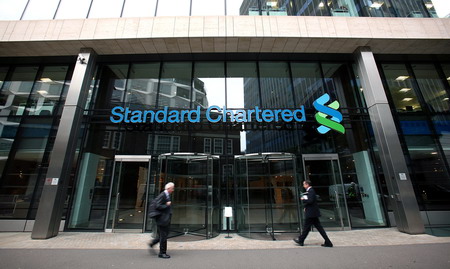Banking
Standard Chartered plans major Chinese expansion
By Hu Yuanyuan (China Daily)
Updated: 2010-11-03 10:15
 |
Large Medium Small |
|
 |
|
Pedestrians pass the private banking unit of Standard Chartered Plc in London. The bank plans to launch 40 more branches in China by the end of 2011. [Photo/ Bloomberg] |
BEIJING - Standard Chartered Plc, the London-based financial services group, will accelerate the expansion of its Chinese banking business, with the aim of launching 40 more branches in the country by the end of 2011, said John Peace, chairman of the board, in an exclusive interview with China Daily.
Speaking before the company's first-ever board meeting on Chinese soil, Peace said that Standard Chartered had opened more than 60 branches in the world's fastest-growing economy by the end of October.
In this year, the bank is planning to increase staff numbers by 20 percent, open 30 percent more branches and expand business in China's financial market by 40 percent.
"China is a key market for our bank. Over the last two years, we have discussed ways of growing the business in many different areas," said Peace, who added that the company will continue its significant investment in what it regards as an important market. "Standard Chartered is in a great position to support trades between the Chinese mainland, Hong Kong and Taiwan," he said.
In July 2009, Standard Chartered HK became the first foreign bank to complete a two-way trade settlement between Hong Kong and the Chinese mainland.
Meanwhile, in August of the same year, its Chinese division was the first foreign bank to be appointed as the agent and settlement bank for yuan cross-border settlements.
It now offers yuan trade settlement services in a number of locations including Hong Kong, Singapore, Japan, the United States, and the United Kingdom. More countries and regions are due to come online soon.
He also said the cooperation with the Agricultural Bank of China (ABC), one of the country's top four commercial banks, is an important part of its future strategy.
The collaboration brings with it the advantages offered by ABC's large domestic distribution network of 23,000 branches and outlets which serve about 2.6 million corporate customers and 320 million retail customers.
On June 30, Standard Chartered announced it will invest $500 million in ABC's H shares IPO in Hong Kong. The collaboration includes international trade corridors, SMEs and the consumer finance sectors.
The core development strategy of the bank is organic growth, but it also keeps a close eye on merger and acquisition opportunities when they make sense financially and strategically, Peace said.
So far, the bank has no intention of entering any other financial sector, he said. Standard Chartered recently raised a one-for-eight rights issue of about $5 billion to strengthen its balance sheet.
Peace said this will enable the group to meet the Basel III countercyclical buffer (the financial mechanism establishing a set of minimal capital requirements for banks).
Chen Jia contributed to this story.




